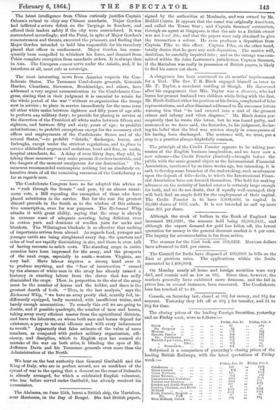The Confederate Congress have so far adopted this advice as
to " rush through the Senate " and pass, by an almost unani- mous vote, a Bill repealing the exemption of those who have placed substitutes in the service. But for the rest the greatest discord prevails in the South as to the wisdom of this exhaus- tive conscription, even for war purposes. The Richmond Whig attacks it with great ability, saying that the army is already in extreme want of adequate covering, being deficient even in cotton yarn and destitute of woollen yarn for socks and blankets. The Wilmington blockade is so effective that nothing of importance arrives from abroad. As regards food, younger and younger cattle are being slaughtered every day, the quarters and sides of beef are rapidly diminishing in size, and there is even talk of having recourse to milch cows. The standing crops in entire counties have been impressed for the army, and the prospects of the next crops, especially in south - western Virginia, are very bad. Slave labour requires a strong hand over it to produce anything, and the " fear of insurrection " caused by the absence of white men in the army has already caused a leniency in exacting labour from the slaves that has sadly diminished the crops. Then, in proportion to the size of the army must be the number of horses and the fodder, and there is the greatest dearth of both. " Thus, in the last analysis," says the Richmond Whig, "we have an army poorly clad, scantily fed, in- differently equipped, badly mounted, with insufficient trains, and barely enough ammunition. To remedy this evil we are going to double, and if possible quadruple, the number of men and horses, taking away every efficient master from the agricultural districts, and leave the labourers, on whom both men and horses depend for existence, a prey to natural idleness and with every inducement to revolt." Apparently that false estimate of the value of mere numbers, as compared with perfect military organization, effi- ciency, and discipline, which to English eyes has seemed the mistake of the war on both sides, is blinding the eyes of Mr. Jefferson Davis and his Tennessee generals even more than the Administration of the North.
































 Previous page
Previous page